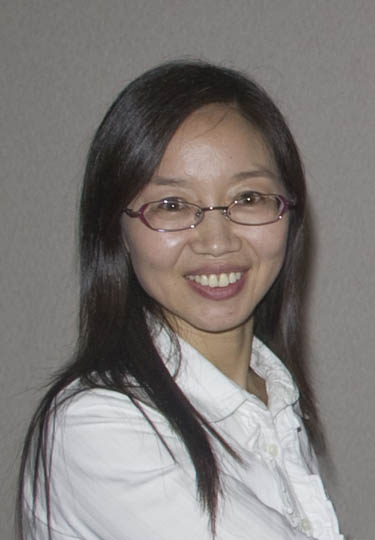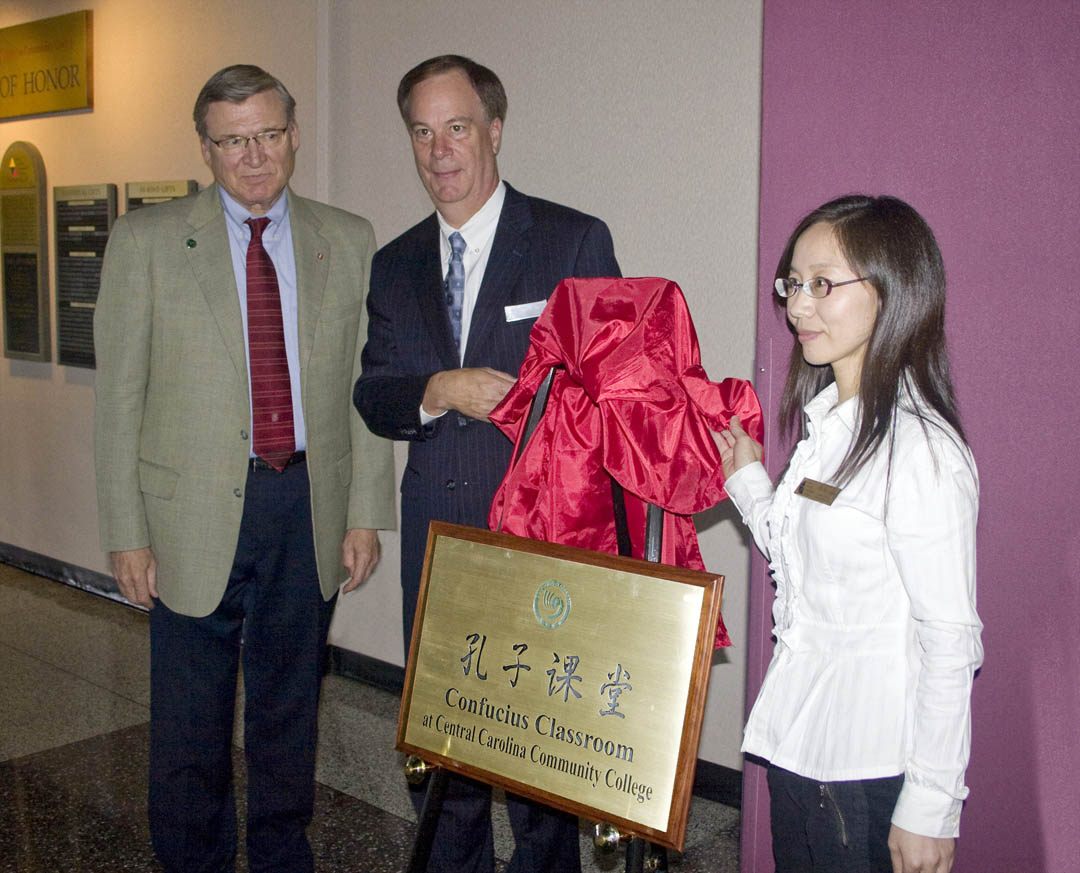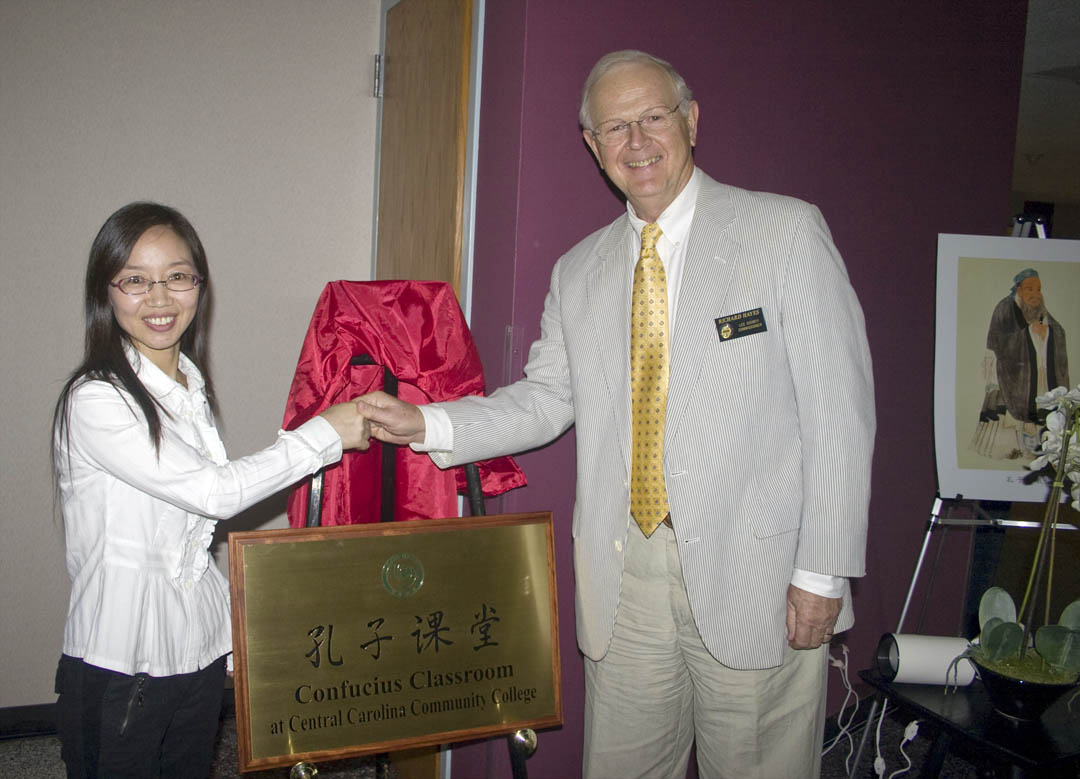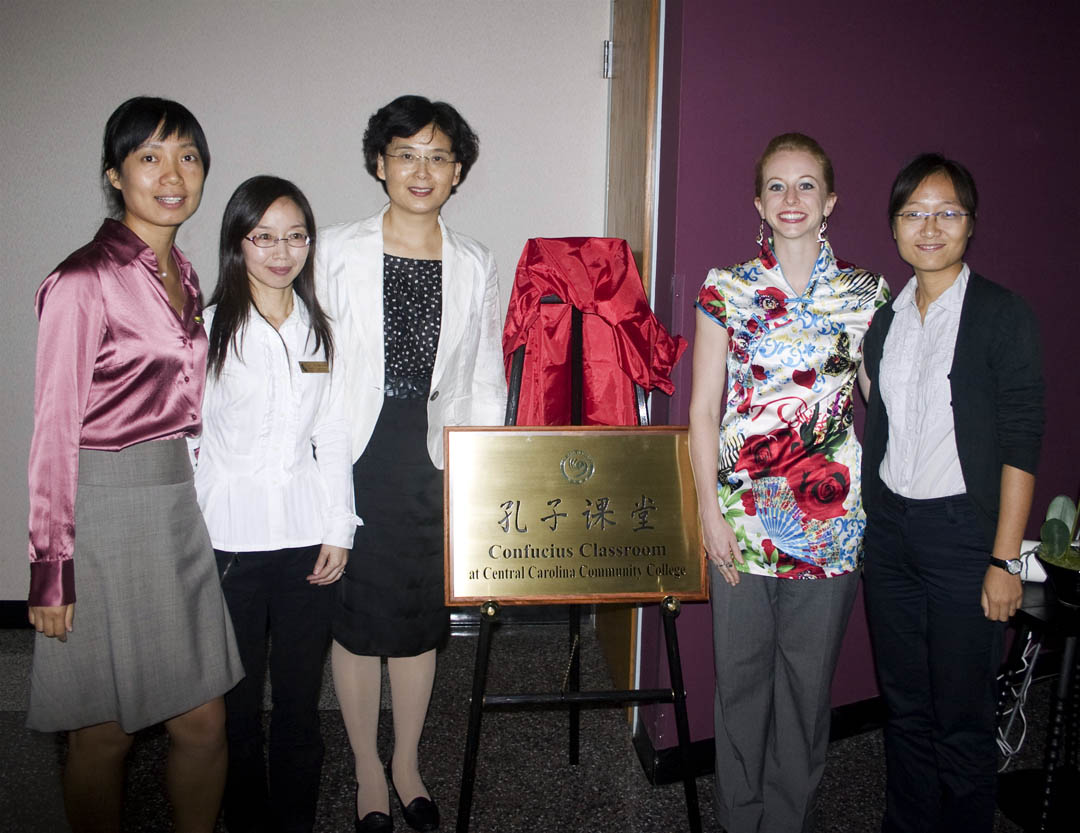
Confucius Classroom instructor Dr. Shuya Che

SANFORD - Confucius would have enjoyed being at Central Carolina Community College Sept. 15.
The great Chinese thinker and social philosopher of the 6th century B.C. held education and wisdom as a fundamental principle of life. In the 21st century, Confucius Institutes and Classrooms throughout the world honor this principle by teaching Mandarin Chinese language and Chinese culture at educational institutions in many nations.
Central Carolina Community College is now among them. The opening reception for the college’s Confucius Classroom, on Sept. 15, brought together leaders of the college, community, local government and business with educators from North Carolina State University and its Confucius Institute.
NCSU’s Institute signed a memorandum of understanding with the college in April for a partnership to establish a Confucius Classroom at the college. NCSU is the first university in the United States to develop this type of partnership and Central Carolina is the first community college in the U.S. to have a Classroom.
At the reception, the Institute officially presented the college with a large wall plaque stating “Confucius Classroom at Central Carolina Community College” in English and Mandarin.
Central Carolina President Dr. Bud Marchant described the establishment of the Classroom as “an extremely exciting” event for the college, making it a part of and a contributor to the growing relationship between North Carolina and China.
The Confucius Classroom programs will be open to residents, students at the college and local schools, and business people within the college’s service area of Chatham, Harnett and Lee counties. Through the Classroom, they will have access to instruction in the Mandarin language and Chinese culture as well as Institute programs such as Chinese art exhibitions and other cultural events.
They will also have opportunities to visit the People’s Republic of China and to have Chinese visit this area. The goal is to increase mutual understanding, improve relations between the countries, and benefit businesses in both.
“We are truly an interlinked world,” said Dr. James Zuiches, NCSU vice chancellor for the Office of Extension, Engagement and Economic Development. “This Confucius Classroom will educate students about China. It will help young people understand this world and our economic relations with China.”
The Confucius Institute and Confucius Classroom are outreach programs of the People’s Republic of China’s National Office of Teaching Chinese as a Foreign Language (Han Ban). Their purpose is to make Mandarin Chinese language instruction and Chinese cultural studies available through educational institutions throughout the world. NCSU’s Confucius Institute is a partnership between the university, Nanjing Normal University, and Han Ban.
Dr. Shuya Che, associate professor of Chinese linguistics and literature at Nanjing Normal University, has been sent by Han Ban to teach the college’s Confucius Classroom. She will be a visiting professor at the college, teaching the Classroom programs and doing community outreach.
“I am very happy to be here,” Che told the gathering. “Now, more Americans can know China and understand Chinese and we can be friends forever.”
The Confucius Institute has donated 1,000 teaching and reference books to the college on Chinese language and culture. Classes will be offered through both the continuing education and curriculum divisions. Local school districts are also partners in the Classroom, and their students can participate.
Growth of interest in Chinese language and culture has increased as that nation has become a major world power. Chinese is second only to English as an international language of business in the world. Its growing importance for North Carolina is reflected in the fact that China is the state’s second-largest trading partner. Gov. Bev Perdue will visit China in October in hopes of boosting commercial and cultural ties with that nation, according to her office.
“This Confucius Classroom at CCCC is an absolutely fascinating opportunity for businesses, students and people in the college’s area,” said Bob Heuts, director of the Lee County Economic Development Corporation. “China has been a closed culture for thousands of years and is now a major player on all fronts in the world, economic and anything else you want to think of. This Classroom and the relationship with NCSU is something that sets this area apart from any other in the country. Having this should be a competitive advantage for us.”
Stelfanie Williams, vice president over the college’s new Division of Economic & Community Development, agreed. That division will offer the first Confucius Classroom courses at the college through its Continuing Education Department.
“Undoubtedly, the Confucius Classroom will be a resource for local businesses and community agencies,” she said. “As a community college in the center of our state, we hope the impact will be far-reaching.”
Marchant brought the idea of a Confucius Classroom to Central Carolina C.C. when he became president in August 2008. He had lived in Clinton, S.C., where Presbyterian College has a Confucius Institute. As a result, Chinese scholars, tourists and business people visit that area.
When he found that NCSU has a Confucius Institute, he and other college administrators contacted the university. NCSU and its Institute were enthusiastic about starting a Classroom at the community college.
“This is a great opportunity to improve the mutual understanding and friendship between China and America,” said Institute Deputy Director Dr. Xiaoying Wang.

Confucius Classroom instructor Dr. Shuya Che

Dr. James Zuiches (left), North Carolina State University vice chancellor for the Office of Extension, Engagement and Economic Development; Dr. Bud Marchant, president of Central Carolina Community College; and Dr. Shuya Che, professor for the college’s new Confucius Classroom, unveil a ‘Confucius Classroom at Central Carolina Community College’ plaque during a reception Sept. 15 at the college. NCSU operates a Confucius Institute and the university is partnering with the college to establish the Confucius Classroom at the college. The program will teach Mandarin Chinese language and Chinese culture, as well as offer cultural activities and travel opportunities for residents, government and business people in the college’s service area of Chatham, Harnett and Lee counties.

North Carolina State University’s Confucius Institute and Central Carolina Community College celebrated the establishment of a Confucius Classroom at the college with a reception at CCCC on Sept. 15. During the reception, the Institute officially presented a ‘Confucius Classroom at Central Carolina Community College’ plaque to the college. Following the unveiling, Richard Hayes (right), chairman of the Lee County Board of Commissioners, welcomed Dr. Shuya Che, from Nanjing Normal University. She will teach the Classroom programs as a visiting professor at Central Carolina C.C. In partnership with the Institute, the Classroom will teach Mandarin Chinese language and Chinese culture, as well as offer cultural activities and travel opportunities for residents, government and business people in the college’s service area of Chatham, Harnett and Lee counties.

North Carolina State University’s Confucius Institute and Central Carolina Community College celebrated the establishment of a Confucius Classroom at the college with a reception at CCCC on Sept. 15. During the reception, the Institute officially presented a ‘Confucius Classroom at Central Carolina Community College’ plaque to the college. In partnership with the Institute, the Classroom will teach Mandarin Chinese language and Chinese culture, as well as offer cultural activities and travel opportunities to residents, government and business people in the college’s service area of Chatham, Harnett and Lee counties. Among those attending the reception were (from left) NCSU Confucius Institute program coordinator Guanglin Dai; Confucius Classroom professor Dr. Shuya Che; and Institute deputy director Dr. Xiaoying Wang, program coordinator Anna Lamm, and faculty member Lijuan Wang.